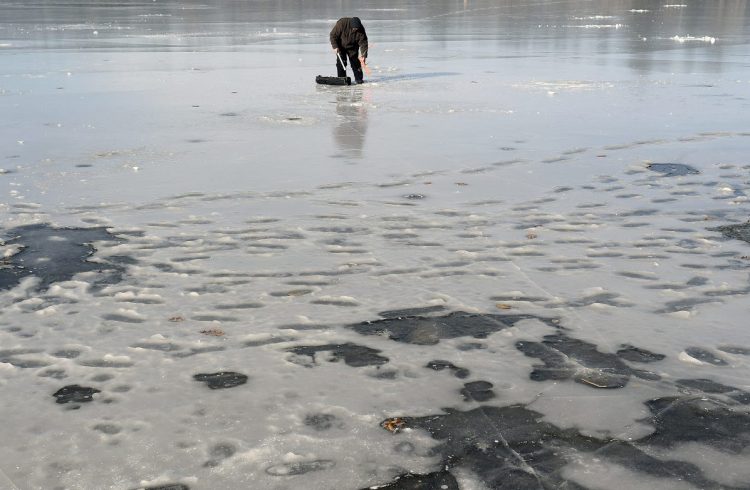Lower than normal temperatures throughout Maine have meant ice has started to form earlier than usual on many of the state’s bodies of water, prompting the Maine Warden Service to urge people to check conditions before ice fishing or going out on the ice.

Landon Blaisdell swings an ice auger equal to his own height while he and his family fish on Messalonskee Lake in Oakland on a cold Monday. Landon’s father reported the black ice was 4 inches thick.
“The ice is doing pretty well for this time of year,” Maine Warden Service Cpl. John MacDonald said. “It seems like there’s been unprecedented cold, so a lot of the smaller ponds are freezing, though the lakes certainly aren’t safe yet.”
In Augusta and Waterville, the average temperature of 32.8 degrees this November was about 4 degrees colder than in 2017, and 6-8 degrees colder than in 2016 and 2015, the National Weather Service said. In Portland, the average temperature this November was 49 degrees, slightly colder than the average of 49.4 degrees for the month.
The warden service doesn’t offer strict guidelines for when it’s safe to go out on ice, advising instead that people always check for themselves. It does however, provide a chart on its website from the American Pulpwood Association that lists 3 inches of clear, blue lake ice as the minimum thickness for a group of people walking single file. Fishing regulations, including if and when ice fishing is allowed, vary by region and body of water.
“Depending on where it is and how it forms, the ice can be very different from one body of water to the next,” MacDonald said. “It should be solid ice that is several inches thick, for sure, and will hold up a walking person, but that’s about as far as I’ll go (in issuing guidelines).”
MacDonald recommends checking the ice with a chisel to test conditions before heading out.
The warden service also advises against ever driving motor vehicles on ice.
“There’s no law against it, but it is a very dangerous practice,” MacDonald said.
CHILLIER THAN USUAL
Temperatures for December also have been below normal so far in Maine, said Eric Sinsabaugh, a meteorologist for the National Weather Service in Gray. In Portland, the average temperature so far in December is 29.7 degrees, or about 3.1 degrees below the normal of 32.8 degrees. Portland’s highest recorded temperature this December was 53 degrees on Dec. 3, with the lowest temperature reaching 11 degrees on Dec. 8.
Sinsabaugh said he could not comment on ice conditions, but “we are looking for this cold weather to continue, so I would imagine the ice would keep forming.”
This week, lows in Portland are forecast to drop into the mid-teens Tuesday night and to a low of 8 degrees Wednesday night. Temperatures in Portland should start to warm up Thursday and Friday with highs reaching into the upper 20s and 30s. In central Maine, temperatures are expected to drop to the single digits Wednesday and Thursday nights.
TIPS FOR SURVIVAL
Ice conditions also are a concern for snowmobilers, and the warden service recommends not crossing lakes or rivers on snowmobiles.
In January 2017, a Massachusetts man died after the snowmobile he was riding broke through ice near the Oakland boat landing on Messalonskee Lake, prompting the warden service to remind people that lakes and ponds vary widely in ice thickness and safety.
Most people who fall through ice survive without injury, MacDonald said, stressing the importance of keeping a chisel and ice picks handy when ice fishing.
“Some people have the mindset that they’re just going to die, but most people do survive,” MacDonald said. “Obviously, you’re going to get that initial shock of the cold water, but people certainly can overcome that, especially if you’re not in the water for an extended period of time.”
Ice picks on a string or attached to a person’s body can come in handy when trying to get out of cold water and up onto solid ice.
“You can propel yourself back onto the ice with your elbows, but it will be so much easier to do with ice picks,” MacDonald said. “That can help save your life and help get you out of the water quicker.”
Rachel Ohm can be contacted at 612-2368 or at:
rohm@centralmaine.com
Twitter: rachel_ohm
Send questions/comments to the editors.




Comments are no longer available on this story